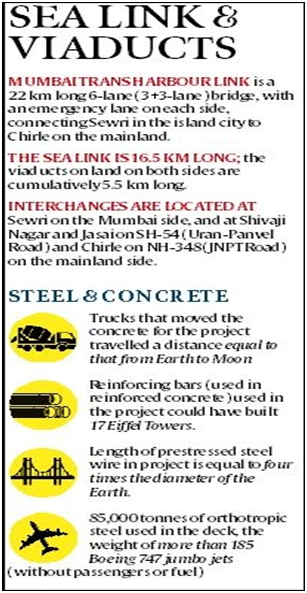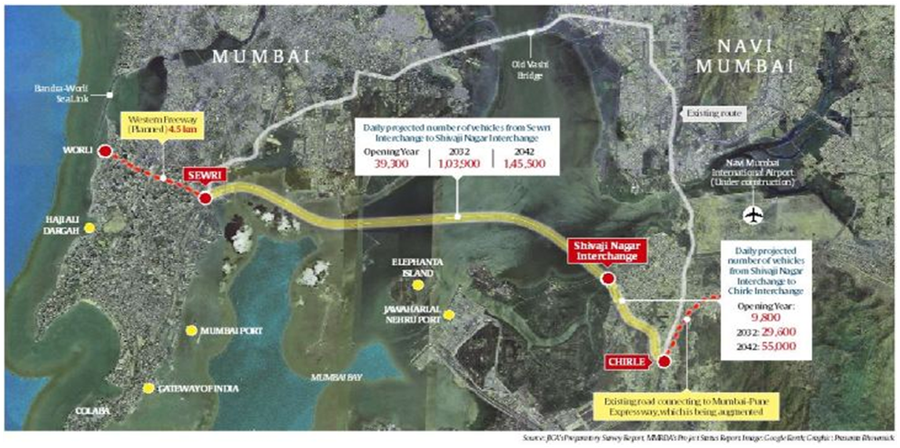Why in News?
- The PM of India will inaugurate the country’s longest bridge over the sea - the 22 km Mumbai Trans Harbour Link (MTHL), officially the Atal Setu Nhava Sheva Sea Link.
- The bridge that was first conceptualised six decades ago will cut the travel time between Sewri (Mumbai) and Chirle (Raigad) to under 20 minutes.
What’s in Today’s Article?
- About the MTHL
- The Idea of a Bay Crossing Connecting Mumbai to the Mainland
- Challenges Encountered During the Construction of the MTHL Project
- How will MTHL Help?
- Some Questions that Remain about MTHL
About the MTHL:

- It is a 22-km-long twin-carriageway six-lane bridge over the Thane Creek in the Arabian Sea, connecting Sewri in the island city of Mumbai to Chirle in Raigad district on the mainland.
- The MTHL includes a 16.5 km sea link and viaducts on land at either end with a cumulative length of 5.5 km.
- While the project’s contractors sourced engineers and experts from across the globe, most of the labourers hired were from states such as Bihar, Orissa, Uttar Pradesh, Punjab and Maharashtra.
- On an average, 5,403 individuals worked daily on the four packages of the project.
- The objective of the project is to improve connectivity in the Mumbai Metropolitan Region which comprises the districts of Mumbai, Thane, Palghar, and Raigad, and promote the region’s economic development.
The Idea of a Bay Crossing Connecting Mumbai to the Mainland:
- It was first floated in 1963 by the American construction consultancy firm Wilbur Smith Associates, but no follow-up action was initiated.
- The plan was revived in the late 90s, and the first tenders were floated in 2006.
- In 2008, Anil Ambani’s Reliance Infrastructure emerged as the preferred bidder after promising to build and recover the cost of building the (then) Rs 6,000 crore bridge in about 10 years through a PPP model.
- However, Ambani withdrew from the project months later.
- Multiple unsuccessful bidding processes followed, and the nodal agency was changed from the Maharashtra State Road Development Corporation (MSRDC) to the Mumbai Metropolitan Region Development Authority (MMRDA).
- The project finally got moving after MMRDA entered into an agreement with Japan International Cooperation Agency (JICA), which agreed to fund 80% of the project cost (rest to be borne by the state and central govts).
- The project was executed by the MMRDA on an Engineering Procurement Contract (EPC) basis.
- While the Indian PM laid the foundation stone of the project in (Dec) 2016, the deal and tendering were finally completed in (Dec) 2017, and work commenced in early 2018.
- A total Rs 21,200 crore has been spent on the project, of which Rs 15,100 is loan from JICA.
Challenges Encountered During the Construction of the MTHL Project:
- The most arduous part of the project was the construction of the segments that lie in the marine portion.
- Here, engineers and workers had to dig as deep as 47 metres in the sea bed to provide strong foundations to hold up the massive girders and deck of the bridge.
- The fact that the bridge lies close to sensitive establishments like ONGC, JNPT and BARC made the construction of these segments more difficult.
- Engineers have to take care that they do not damage any underwater installations such as pipelines or communication cables.
- According to reports submitted by the MMRDA, seven labourers were killed in six accidents during the project.
How will MTHL Help?

- The MTHL will bring down the average travel time between Sewri and Chirle from 61 minutes currently to less than 16 minutes and will decongest the existing route over the Vashi bridge.
- The project is expected to facilitate greater economic integration of Navi Mumbai with Mumbai, with benefits extending to Panvel, Alibaug, Pune, and Goa.
- It will significantly improve connectivity between South Mumbai and the under-construction Navi Mumbai International Airport, the Mumbai Pune Expressway, the Mumbai-Goa Highway, and the main hinterland in general.
- It will also provide improved access to Jawaharlal Nehru Port.
Some Questions that Remain about MTHL:
- While the project has obvious benefits, there are doubts on whether it will be of help to regular commuters who travel between Mumbai and Navi Mumbai every day.
- The Rs 250 toll for a one-way crossing of the Trans Harbour Link is deemed to be high.
- Also, the landing points of the bridge on the mainland side are more than 10 km away from the main residential areas.
- No public transport facilities, such as buses on a dedicated lane, have been announced on the bridge yet.









